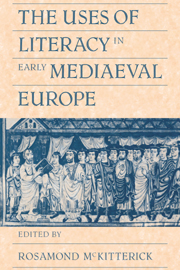Book contents
- Frontmatter
- Contents
- List of illustrations
- Contributors
- Preface
- Abbreviations
- Introduction
- 1 Literacy in Ireland: the evidence of the Patrick dossier in the Book of Armagh
- 2 Anglo-Saxon lay society and the written word
- 3 Administration, law and culture in Merovingian Gaul
- 4 Literacy and the papal government in late antiquity and the early middle ages
- 5 Literacy and the laity in early mediaeval Spain
- 6 Aspects of mediaeval Jewish literacy
- 7 Writing in early mediaeval Byzantium
- 8 Literacy displayed: the use of inscriptions at the monastery of San Vincenzo al Volturno in the early ninth century
- 9 Royal government and the written word in late Anglo-Saxon England
- 10 Literacy in Carolingian government
- 11 Text and image in the Carolingian world
- Conclusion
- Index
5 - Literacy and the laity in early mediaeval Spain
Published online by Cambridge University Press: 07 December 2009
- Frontmatter
- Contents
- List of illustrations
- Contributors
- Preface
- Abbreviations
- Introduction
- 1 Literacy in Ireland: the evidence of the Patrick dossier in the Book of Armagh
- 2 Anglo-Saxon lay society and the written word
- 3 Administration, law and culture in Merovingian Gaul
- 4 Literacy and the papal government in late antiquity and the early middle ages
- 5 Literacy and the laity in early mediaeval Spain
- 6 Aspects of mediaeval Jewish literacy
- 7 Writing in early mediaeval Byzantium
- 8 Literacy displayed: the use of inscriptions at the monastery of San Vincenzo al Volturno in the early ninth century
- 9 Royal government and the written word in late Anglo-Saxon England
- 10 Literacy in Carolingian government
- 11 Text and image in the Carolingian world
- Conclusion
- Index
Summary
In the early seventeenth century the Morrocan author Al-Maqqarî, looking back on the departed glories of Al-Andalus, recalled that:
rich men in Cordova, however illiterate they might be, encouraged letters, rewarded with the greatest munificence writers and poets, and spared neither trouble nor expense in forming large collections of books; so that, independently of the famous library founded by the Khalif Al-hakem [961–76], and which is said by writers worthy of credit to have contained no less than four hundred thousand volumes, there were in the capital many other libraries in the hands of wealthy individuals, where the studious could dive into the fathomless sea of knowledge and bring up its inestimable pearls. Cordova was indeed in the opinion of every author the city in Andalus where most books were to be found, and its inhabitants were renowned for their passion for forming libraries.
His words may seem ambivalent. On the one hand he hints that some of these avid collectors may not have been able to read the books they sought so hard to acquire, whilst on the other he implies that the substantial libraries that they formed were accessible to scholars more studious if less rich than themselves. Al-Maqqarî's principal source here would seem to have been the thirteenth-century author Ibn Sa'îd, whose own purposes were both satirical and moralizing. He was criticizing the wealthy collectors who were interested only in the outward show of their books: the rarity value of the works and the fame of their calligraphers. Some modern bibliophiles might find his words uncomfortable.
- Type
- Chapter
- Information
- The Uses of Literacy in Early Mediaeval Europe , pp. 109 - 133Publisher: Cambridge University PressPrint publication year: 1990
- 7
- Cited by



